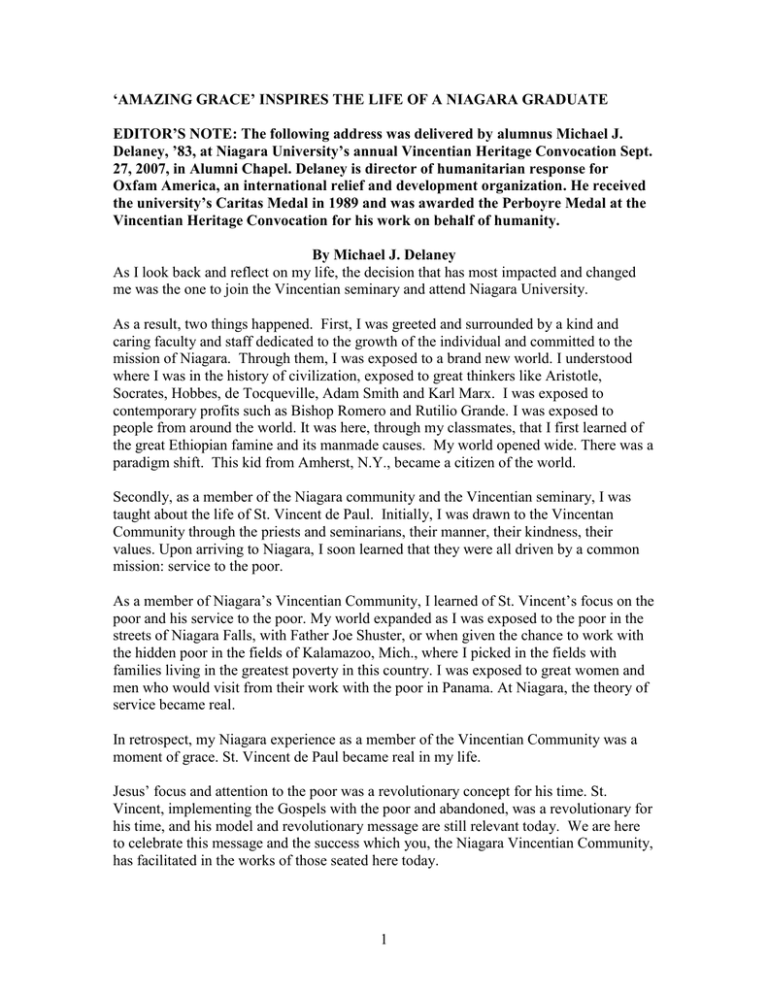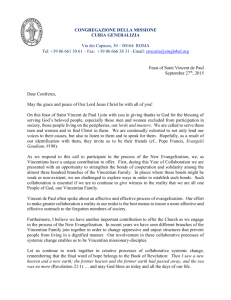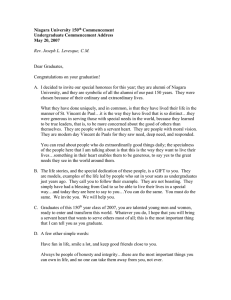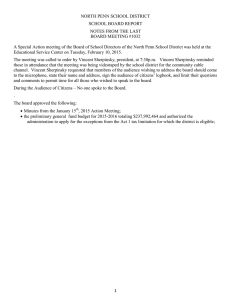‘AMAZING GRACE’ INSPIRES THE LIFE OF A NIAGARA GRADUATE
advertisement

‘AMAZING GRACE’ INSPIRES THE LIFE OF A NIAGARA GRADUATE EDITOR’S NOTE: The following address was delivered by alumnus Michael J. Delaney, ’83, at Niagara University’s annual Vincentian Heritage Convocation Sept. 27, 2007, in Alumni Chapel. Delaney is director of humanitarian response for Oxfam America, an international relief and development organization. He received the university’s Caritas Medal in 1989 and was awarded the Perboyre Medal at the Vincentian Heritage Convocation for his work on behalf of humanity. By Michael J. Delaney As I look back and reflect on my life, the decision that has most impacted and changed me was the one to join the Vincentian seminary and attend Niagara University. As a result, two things happened. First, I was greeted and surrounded by a kind and caring faculty and staff dedicated to the growth of the individual and committed to the mission of Niagara. Through them, I was exposed to a brand new world. I understood where I was in the history of civilization, exposed to great thinkers like Aristotle, Socrates, Hobbes, de Tocqueville, Adam Smith and Karl Marx. I was exposed to contemporary profits such as Bishop Romero and Rutilio Grande. I was exposed to people from around the world. It was here, through my classmates, that I first learned of the great Ethiopian famine and its manmade causes. My world opened wide. There was a paradigm shift. This kid from Amherst, N.Y., became a citizen of the world. Secondly, as a member of the Niagara community and the Vincentian seminary, I was taught about the life of St. Vincent de Paul. Initially, I was drawn to the Vincentan Community through the priests and seminarians, their manner, their kindness, their values. Upon arriving to Niagara, I soon learned that they were all driven by a common mission: service to the poor. As a member of Niagara’s Vincentian Community, I learned of St. Vincent’s focus on the poor and his service to the poor. My world expanded as I was exposed to the poor in the streets of Niagara Falls, with Father Joe Shuster, or when given the chance to work with the hidden poor in the fields of Kalamazoo, Mich., where I picked in the fields with families living in the greatest poverty in this country. I was exposed to great women and men who would visit from their work with the poor in Panama. At Niagara, the theory of service became real. In retrospect, my Niagara experience as a member of the Vincentian Community was a moment of grace. St. Vincent de Paul became real in my life. Jesus’ focus and attention to the poor was a revolutionary concept for his time. St. Vincent, implementing the Gospels with the poor and abandoned, was a revolutionary for his time, and his model and revolutionary message are still relevant today. We are here to celebrate this message and the success which you, the Niagara Vincentian Community, has facilitated in the works of those seated here today. 1 Let me share with you three key aspects of Vincent’s life and teaching that have had a profound influence on me. 1. His willingness to seek out and serve the poor. What made Vincent different from others of his time was that he looked for and sought, outside of his comfort zone, the world he described as “human misery.” 2. He listened to the poor. He was present to the poor, he knew the smells that poor people knew, he knew the feel and knowledge of the poor while in their service. This was his commitment. It was from this grounding, “this perspective,” that he analyzed the structural issues. Through his up-close knowledge of a given situation, he would be able to analyze a problem with confidence, which leads to the last point. 3. His ability to put forward structures that would respond to problems in a sustainable way--the quest for sustainable solutions. St. Vincent saw the gaps and set up systems and structures. He was great at creating structure. Some have described him as a business manager. His goal was making things last. Thus: Unorganized “good intentions” became structured local charities. Service to the poor required full-time attention. With Louis de Marillac, he supported the Daughters of Charity, not to be cloistered, but to be out with the poor. When 17th-century men were looking at the role of priest as a job of status, with no real understanding of the duties and responsibilities entailed, he opened seminaries to inspire candidates and to bring zeal and knowledge to the priesthood. When there were no priests dedicated to serving the poor in rural areas, he founded the Congregation of the Mission, the Vincentians, to serve the poor and to keep the members of the congregation focused on them with enthusiasm and love. These lessons from St. Vincent have had a long-term impact on my life, and I humbly believe that they form one thread that has connected all I have done in life. Seeking out the poor, serving the poor One thing that stayed with me from my experience in Kalamazoo, Mich., was the fact that migrant families, despite working incredibly hard from sun up to sun down, with their children working alongside them in the field, still remained poor. The children had to sleep on the dirt floors of their shacks. They had no access to clean water and were required to buy their food in the company store. Even with that, they said the situation was worse where they came from--Mexico. The seed planted so well at Niagara of St. Vincent’s “seeking out those in poverty” inspired me to seek out the poorest of the poor. So I made that next step and traveled to Mexico, where I worked with poor communities living in the Tijuana garbage dump. Their only meal came if they found enough cardboard, glass and metal to sell in the scrap 2 market. I also began working with the Franciscan sisters who were catering to the poor in the Tijuana prison system, providing many prisoners with their only meal of the day. At one point, because of the horrible conditions, we actually cleaned and painted the jail. Ironically, it was this “presence” in the jail, being with the poor, that provided exposure to the plight of the political refugees who were being temporarily imprisoned before being deported back to Guatemala and El Salvador. Their message was clear. They were living in extreme poverty under an oppressive regime run by a few families living in luxury. Inspired by their stories, I next found myself in the midst of one of the bloodiest civil wars in the history of Latin America. One image I will never forget from working in the camp in El Salvador was the arrival of the refugees. When the refugees arrived, packed like cattle in the giant Red Cross trucks, the bell would ring and the entire camp would come out to greet them. It was a dramatic scene. Although not knowing one another, they shared the common bond of survival, unlike the tens of thousands who lost their lives in the countryside. It was a celebration that they had survived the bombings, the strafing, and being hunted by the military. They survived by hiding and living underground for weeks on end. Soon, however, it was apparent that the cleansing of the countryside had an impact on those that made it back, the children. At one point after the arrival of a group of new refugees, each day there was a child’s funeral. I can still see those funeral processions today and the men carrying the tiny little box with the child’s body. Worn down in their flight as refugees by the lack of food, they were just too weak to survive. There were women comforting the mother who attempted to keep her child alive, and the children who were confused, but knew they had lost a sibling, a cousin or a neighbor. It was those children’s coffins in El Salvador that brought me to the clear realization that the children did not die of any natural causes. They were weak from being pursued, they were without food. Not only was it those children, but the entire countryside of San Salvador. The military was out of control, pursuing civilian populations to achieve their political victory. This was not only against our Christian faith, but against the humanitarian laws outlined in the Geneva conventions. In this case, it was starving babies and massacres. What I knew at that moment, and what been confirmed by later experiences, is that almost all humanitarian crises can be prevented. The lessons of serving the poor, taking the perspective of the poor, led me to ask what the sustainable solution would be. My answer at that time was the need for policy change, particularly with the U.S. government, which led me to the NGO (nongovernmental organization) world. Amazingly, in the span of human history, the NGO is a recent phenomenon. Most are barely 60 years old. Most started during or after World War II. Oxfam got its start in Oxford, England. The people of Oxford were sympathetic to the plight of the people of Greece under Nazi occupation. The allies had an embargo around Greece to squeeze the oppressive leadership, but in that time, as now, embargos hurt common people more than they hurt the occupying power. As the world watched the people of Greece slowly starve, 3 the people of Oxford raised money, gathered goods, and broke the embargo by channeling relief aid to the people of Greece. From those humble beginnings of meetings in people’s living rooms, Oxfam International today works in more than 110 countries with a budget of close to $1 billion in annual programs. Most importantly, it is an influential player, seen as an objective thought leader on issues of poverty and injustice in influential venues around the world. With Oxfam, I have had the opportunity to initiate and lead the humanitarian program in the U.S. and worldwide. It has brought me to droughts in Ethiopia, hand in hand with poor pastoralists as their weak cattle, their only assets, fall and die in one of the worst droughts in Ethiopian history. It has brought me to Central America in the midst of Hurricane Mitch, when homes tumbled into the ravines and entire villages were washed away. I have stood on the shore of Aceh, Indonesia, with a survivor of the tsunami. In the midst of rubble, the loss of his family, and the loss of more than 3,000 people in his village, he told me he wanted to rebuild. And I recently returned from Pisco, Peru, where a devastating earthquake hit, and where I met the Vincentian priests and Daughters of Charity who were helping support their city and communities, even though they were still in mourning from the loss of two of their own and 146 others who died when the ceiling of the church fell in during Mass. My missions were not only to be there, but to make sure that we, as Oxfam, were serving, listening, providing hope, and looking for long-term sustainable solutions. Let me give an example of what this looks like: I spoke of the drought in 2000 in Ethiopia. Oxfam worked on multiple levels to respond to that crisis. One of the things we are known for is providing immediate water to save lives in an emergency. Instead of hauling water with expensive trucks, we brought camels in to carry the water to remote villages to avoid the creation of refugee camps-places where diseases can breed and promote long-term dependence. We started programs to help people earn money and improve their communities so they could buy the aid and food that they wanted, not what was given to them. The projects they worked on were water catchment ponds and wells, so that they would have constant sources of water in the future. After we evaluated it, we saw the project saved lives. Years later, the role of women changed and they did not have to travel three hours a day to fetch water. Agriculture changed, and in the next drought five years later, the people were untouched. In fact, people were coming from as far as Kenya and Somalia to use the water that we generated as part of the emergency response. It was a true testament to lasting change. 4 I am convinced, in this response and in others, that our credibility and our authenticity come from the three lessons of Vincent: serve, listen, and look for sustainable solutions. Looking forward Faced with the challenges in our world, this is what I think St. Vincent would focus on today. Earlier this year, I returned from my second trip to the Darfur region of Sudan. Darfur is simply a place of abandonment. It is a place of sand and sky. I felt the presence of evil in Darfur. The people of Darfur, while watching their government grow rich with oil revenue, began to demand attention and investment in their region. These demands were met by disproportionate attacks by the government’s brutal surrogate army, called the Janjaweed. That army has killed and displaced hundreds of thousands of people and has committed horrific crimes on a scale I find difficult to share with you today. Still today, more than 2 million people are living in refugee camps, and the people remain abandoned. It will take all of our efforts to help bring those accountable to justice and bring the poor refugees back to their land. Climate Change We know that climate change is happening. There is scientific proof from all parts of the world—from melting polar ice in Greenland and melting glaciers in the Andes to floods in Ethiopia, when it is supposed to be dry, to drought in Mozambique, when it is supposed to rain. It will affect us all. A couple of degrees’ difference will make an enormous impact on all of us--from the frequency and severity of hurricanes and cyclones to rising water levels along ocean coasts to diminishing water sources. Over 25 million people have had to move from their homes because of diminishing water sources. Some predict 500 million in 40 years. What we also know is that climatic change impacts the poor more than anyone. The poor are often living in the most vulnerable areas, with no savings or insurance. One-third of the world is living on less than $1 a day. A slight change in rainfall has disastrous impacts on people. Whether it is Bangladesh or Louisiana, natural disasters always have the most impact on the poor. What is our biggest challenge? We must do more for the poor and disenfranchised, the people who are most vulnerable to increased floods, droughts, and the increasing severity of storms that come with climate change. At Oxfam, we have initiated a disaster riskreduction program that targets the most vulnerable people around the world. There are many things that can be done to save lives and the livelihoods of poor people—from emergency preparedness plans to durable housing. The idea here is simple: Poor people can and will protect their own communities from disaster, if given the resources. The program will not only save lives, it will transform people from victims to partners in securing their future. Second, we must work on the policy side to halt and turn back the harmful direction we 5 are heading toward as a world community. Otherwise, it will have disastrous consequences for all of us, but it will impact the poor first and the most. A third challenge is to develop more programs for young people to get involved with the poor. Niagara has some excellent programs, but we need to make it easier for young people to go and serve the poor. We need to make connections between organizations and youth around the world, and use new means to connect people. We need to find jobs that allow young people to pay back their loans while living out their commitment. It should be easier. In conclusion, I have tried to share some of the simple experiences that were grounded around the core message Jesus brought to this world and on which St. Vincent taught us to focus. As Vincent said, “People in poverty should be treated as royalty, for they are in God’s eyes.” You, as the Vincentian Community, have invested in me. I am back here today to say thanks. I acknowledge this investment, this gift, this grace, every day of my life. I wake with it, I take it to work, and I have taken it with me on my journeys around the world. That thread of connection comes back to you, the Niagara community, a Vincentian university. I am but one thread. You have sent out many, such as the shining examples who are here tonight. You are special people, doing exceptional work in formation. You are generating a movement, and I stand here before you honored to be a part of this movement, and honored to consider myself Vincentian. 6




